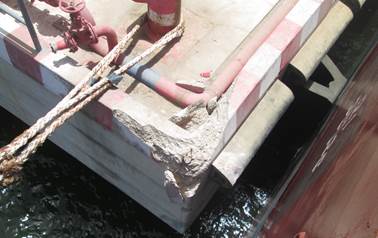The Port of Noukachott in Mauritania has been redeveloped, but there continue to exist some issues and concerns over procedures and infrastructure which may impact on vessels calling at this port.

Broken and exposed corner at a terminal (Source: Mcleans)
Developments
Recently the country of Mauritania developed new port infrastructure at Noukachott and it is worth members taking note of changes and features which may impact further calls at this port.
In the past there have been issues with respect to the exposure of the port to the Atlantic, as well as with the adequacy and soundness of fendering at quay sides. It would appear that some issues continue to persist.
From information provided by the Association's correspondents, it is understood that the construction work has now been completed after commencing in 2010. This included three new quays including an oil terminal that is meant to be able to receive tankers of up to 40,000 dwt with a maximum draft of 12 m. It will be necessary to verify actual drafts with local agents prior to arrival.
Another new feature is the five kilometre dyke, which protects parts of the port against the open sea of the Atlantic.
The intention is to see an expansion of activity and trade at the port for multiple cargo types.
A pictorial overview of the new port developments can be found in the visual guide prepared by Messrs. Mcleans and republished here with their kind permission.
Berth safety
Club correspondents have been following up on developments locally and in particularly there has been concerns about the poor state of fendering at some of the new quays that have been built.
It would seem that while relatively new in construction, a number of fenders appear cracked, broken or otherwise not in full working condition. Incidents involved were said to have been no more than regular berthing operations which would indicate the fenders themselves or their installation are at issue.
There have already been some claims that have followed incidents at these quays, both in regard to hull damage on vessels coming in to berth as well as damage compensation claims for the alleged fender damage from the port side.
It was the intention of the port to not use the particular quays concerned while new fenders were being sourced, but it would appear that due to congestion concerns, vessels have still been ordered in.
Safe navigation and berthing
Given the known issues, it would be prudent for masters to seek latest information and updates from local agents about the state of any particular quay or berth that the vessel is intended to come alongside at.
Should there be concerns over safety, then it would again be prudent to carefully check in advance whether or not berthing can be carried out safely.
If a vessel is coming alongside and there are serious concerns by the master about the safety of the quay / berth or indeed the overall operation, then he should be free to take immediate measures to prioritise the safety of the crew and vessel. That may mean having to abandon the berthing operation.
If possible, and safe to do so, a visual record should be made of any issues or concerns that may be found at a particular quay or berth. It assists greatly in dealing with allegations and claims if the pre-existing condition of the locale can be clearly demonstrated.
If in doubt, or if urgent assistance is needed, club correspondents should be contacted directly and promptly for immediate help.
The Association has had to deal with a number of such issues in various ports around the world and even seemingly minor fender / berth damage situations have generated very significant claims. A scenario where even a small amount of oil (be it cargo or fuel) is spilled after a hull puncture can quickly develop in to a very serious situation.
Should such a situation occur, urgent contact should be made with correspondents and the club.
Further reading
The Association has previously published a number of updates on berth safety issues.
For vessel specific enquiries, members are asked to contact their usual Skuld business unit.
The Association is grateful to Messrs. Mcleans for their contribution to this update.